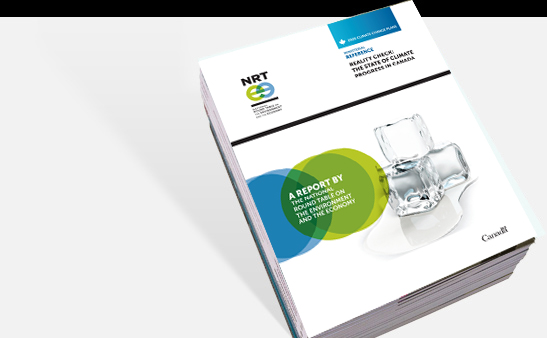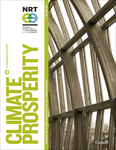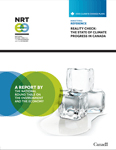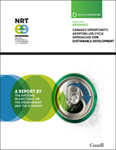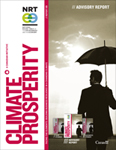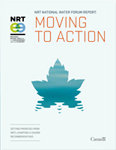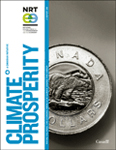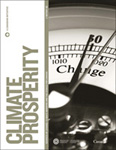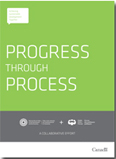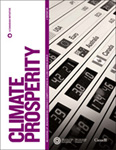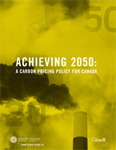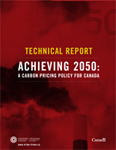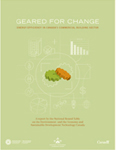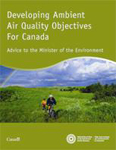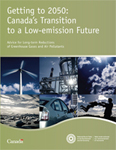6.0 Appendices – Facing the Elements
6.1 BARRIERS TO CANADIAN BUSINESS ACTION TO ADAPT TO CLIMATE CHANGE
Our research and convening activities over the course of one year revealed several factors standing in the way of business action.
Table 4 summarizes the ones most commonly raised by either businesses or industry associations. Our focus was on Canadian needs and challenges, yet the barriers that we highlight are striking in their similarity to those in the 2011 publication “Adapting for a green economy: companies, communities and climate change” by the United Nations Global Compact, United National Environmental Programme, Oxfam, and World Resources Institute. This hints at the broad applicability of these barriers and also of the opportunity for Canada to both learn from and contribute to public- and private-sector innovations worldwide, as markets for adaptation solutions mature.
Businesses can overcome a number of barriers internally (i.e., those in the column “direct business control”). The lack of top management commitment and support, competing priorities, and organizational culture are critically important but far from unique to climate change adaptation and so we skip these in our descriptions below.
TABLE 4
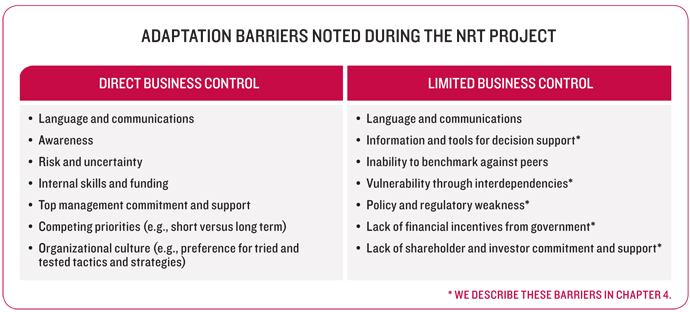
// LANGUAGE AND COMMUNICATIONS: Climate change adaptation is a vague term. And many still perceive climate change as an environmental issue. Business managers can increase the internal salience of adaptation by instead referring to specific operational risks related to preparing for severe weather risks or water availability risks, and also to strategic risks such as insurance affordability.
// AWARENESS (of the connection between risks of climate change and business objectives): Limited information and knowledge exists linking the impacts of climate change to businesses risks and opportunities. Available information is too seldom presented in a way that resonates with sector-specific business objectives. Though few businesses fully understand the risks they face as a result of future climate change, many are well aware of the business impacts of extreme events in the current climate (e.g., intense summer precipitation events), and can apply this knowledge as a first step. Several businesses profiled in this report noted the benefits of collaborative partnerships with academic researchers, specialist organizations, professional bodies, and others in similar industries, in increasing awareness and understanding of success factors for climate change risk assessment and adaptation planning.
// RISK AND UNCERTAINTY: Uncertainty around timing and magnitude of climate change impacts remains an impediment to adjusting core practices and business strategy in anticipation of future impacts. This is, in part, due to the perception that managing risks of climate change involves actions with high up-front costs and uncertain, long-term benefits. As a result, the case for action can be a hard sell, particularly with the use of discount rates. But, as examples in Chapter 3 demonstrate, adaptive measures can be inexpensive and implemented incrementally, reducing the need for high up-front costs. The businesses we profile in case studies treat uncertainty about future climate not as a barrier to decision making, but as just another uncertainty among the many they face in business planning.
// INTERNAL SKILLS AND FUNDING: Allocation of staff (expertise and time) and financial resources for climate change risk management is small and often inadequate. Because of wide-ranging consequences of climate change impacts, successful management of the issue requires a diverse skill set, and individuals with technical and management skills are too often overloaded with responsibilities. Collaboration among businesses and with umbrella groups like professional bodies and industry associations is an efficient approach to promoting the integration of climate change adaptation into standard business practices, and to aggregating demand for awareness-raising and education, and for tools or other resources to facilitate decision making.
Action by external parties to overcome barriers is also necessary (i.e., those listed under “limited business control” in Table 4) and these are the barriers we focus on in Chapter 4. The remaining two, “Language and communications” and “Inability to benchmark” merit a brief look:
// LANGUAGE AND COMMUNICATIONS: Industry associations, government departments and agencies and nongovernmental organizations will have more success in promoting adaptation to business audiences with a positive framing rather than a “doom and gloom” framing. Highlighting cost reductions anticipated from the adaptation initiative, or advantages gained relative to the competition, can both create a positive framing. Discussions on commercial and investment opportunities of climate change impacts and adaptation are long overdue in Canada. However, a positive, opportunities framing is not always effective — a prevention framing works well for some audiences (e.g., preventing legal liability). So, understanding sectoral and organizational cultures is an important early step when designing engagement strategies.120
// INABILITY TO BENCHMARK: A lack of best practices in managing climate change risks and of guidance on how to measure, communicate, and benchmark performance against peers are hurdles for businesses looking to adapt. Several reporting frameworks are available to help businesses communicate and disclose actions to manage risks from climate change, but their adoption is voluntary and patchy. As well, consensus is yet to emerge on key performance indicators for comparison within and across industry sectors.
6.2 TOOLKIT
Over the course of the NRT project on business resilience and adaptation to climate change, stakeholders mentioned the following information sources, tools to aid decision making, and other resources that are useful for businesses.
INFORMATION ON CLIMATE CHANGE, IMPACTS, AND ADAPTATION
Canadian Climate Change Scenarios Network: www.cccsn.ca
Climate trend analyses for 18 Canadian regions to 2050: www.iclr.org/images/Bruce_climate_change_info_march_2011.pdf
Intergovernmental Panel on Climate Change: www.ipcc.ch/index.htm
National Round Table on the Environment and the Economy: www.nrt-trn.ca
Natural Resources Canada Impacts and Adaptation website: www.nrcan.gc.ca/earth-sciences/climate-change/community-adaptation/54
Regional climate services: www.ouranos.ca; www.pacificclimate.org; www.parc.ca
The Nature Conservancy Climate Wizard: www.climatewizard.org
World Bank Climate Change Knowledge Portal: sdwebx.worldbank.org/climateportal/index.cfm
GUIDANCE, TOOLS, AND STANDARDS
Australian Government Climate Change Impacts & Risk Management: A Guide for Business and Government: www.climatechange.gov.au/community/~/media/publications/local-govt/risk-management.ashx
British Standards Institution: Climate Change Adaptation. Adapting to climate risks using ISO 9001, ISO 14001, BS 25999 and BS 31100: shop.bsigroup.com/en/ProductDetail/?pid=000000000030213386
Canadian Securities Administrators Environmental Reporting Guidance: www.osc.gov.on.ca/documents/en/Securities-Category5/csa_20101027_51-333_environmental-reporting.pdf
PIEVC Engineering Protocol for Climate Change Infrastructure Vulnerability Assessment: www.nrcan.gc.ca/earth-sciences/projdb/pdf/211_e.pdf
Shaping climate-resilient development: a framework for decision-making: mckinseyonsociety.com/downloads/reports/Economic-Development/ECA%20%20%20Shaping%20Climate%20Resilent%20Development%20%20%20Report%20Only.pdf
Standard CAN/CSA-ISO 14001-04 (R2009) — Environmental Management Systems – Requirements With Guidance for Use: shop.csa.ca/en/canada/environmental-management-systems/cancsa-iso-14001-04-r2009/invt/27002912004
Standard CAN/CSA-ISO 31000-10 — Risk management — Principles and guidelines: shop.csa.ca/en/canada/risk-management/cancsa-iso-31000-10/invt/27030372010
Standard CAN/CSA-ISO 9000-05 (R2010) — Quality Management Systems — Fundamentals and Vocabulary: shop.csa.ca/en/canada/quality-assurance-and-quality-management/cancsa-iso-9000-05-r2010/invt/27012042005
UKCIP Climate adaptation: Risk, uncertainty and decision-making: www.ukcip.org.uk/wordpress/wpcontent/PDFs/Risk.pdf
United Kingdom Climate Impacts Programme (UKCIP) Business Areas Climate Assessment Tool (BACLIAT): www.ukcip.org.uk/bacliat
INSTITUTIONAL NETWORKS
Canadian Centre for Emergency Preparedness (CCEP): www.ccep.ca
Carbon Disclosure Project: www.cdproject.net/en-US/Pages/HomePage.aspx
United Nations Framework Convention on Climate Change Adaptation Private Sector Initiative: unfccc.int/adaptation/nairobi_work_programme/private_sector_initiative/items/4623.php
FINANCIAL INCENTIVES
Canada Revenue Agency Scientific Research and Experimental Development (SR&ED) tax incentive program: www.cra-arc.gc.ca/txcrdt/sred-rsde/menu-eng.html
Sustainable Development Technology Canada SD Tech Fund: www.sdtc.ca/index.php?page=sdtechfunding-niche&hl=en_CA
6.3 STAKEHOLDER ENGAGEMENT
STAKEHOLDER SCOPING SESSION
This meeting took place on June 3, 2011, and considered how the NRT could best contribute to advancing private sector adaptation through its work on business resilience in a changing climate.
Elizabeth Atkinson
Manager-Policy, Climate Change Impacts and Adaptation
Natural Resources Canada
Darren Brown
Senior Policy Advisor
Cement Association of Canada
Bruce Burrows
Vice-President of Public & Corporate Affairs
Railway Association Canada
Nicholas Cheung
National Practice Leader – Sustainability
Canadian Institute of Chartered Accountants
Darrel Danyluk
Chair
World Federation of Engineering Organizations Committee on Engineering and the Environment
Blair Feltmate
Professor and Director, Sustainability Practice
University of Waterloo
Dave Finlayson
Vice President, Science and Risk Management
Canadian Fertilizer Institute
David Foster
Director, Environmental Affairs
Canadian Home Builders’ Association
John Gamble
President
Association of Consulting Engineering Companies
Ed Gregory
Manager, Research and Analysis
Brewers Association of Canada
Jim Hughes
Canadian Association of Petroleum Producers Manager,
Energy Analysis, Imperial Oil
Don Johnston
Senior Director, Policy and Technical Research
Canadian Home Builders’ Association
Pam Laughland
Managing Coordinator
Network for Business Sustainability
Don McCabe
Vice President
Ontario Federation of Agriculture
Thibaut Millet
Conseil patronal de l’environnement du Québec
Chef d’équipe, Changements climatiques et développement durable, Ernst & Young
Michael Mortimer
Program Manager, Built Environment Standards
Canadian Standards Association
Matt Parry
Executive Director, Policy Development
Environment Canada
Paul Steenhof
Project Manager, Climate Change Issues
Canadian Standards Association
Michelle Turner
Manager, Environmental Stewardship
Canadian Electricity Association
THE BOTTOM LINE ON MANAGING CLIMATE CHANGE RISKS AND OPPORTUNITIES: A FORUM FOR FINANCIAL EXECUTIVES
This meeting hosted by the NRT and the Network for Business Sustainability took place on October 27, 2011, to explore the business case for action to manage and adapt to the impacts of climate change.
Elizabeth Atkinson
Manager-Policy, Climate Change Impacts and Adaptation
Natural Resources Canada
Andrea Baldwin
Associate Principal
SECOR
Tima Bansal
Executive Director
Network for Business Sustainability
Ian Bragg
Associate Director, Research, Policy & Institutional Services
Social Investment Organization
Sherri Brillon
Vice President & Chief Financial Officer
EnCana Corporation
Nicholas Cheung
National Practice Area Leader – Sustainability
Canadian Institute of Chartered Accountants
Michael Conway
Chief Executive & National President (Toronto Chapter)
Financial Executives International Canada
John Coyne
Vice President & General Counsel
Unilever Canada Inc.
Julie Desjardins
Advisor
Canadian Institute of Chartered Accountants
Blair Feltmate
Professor and Director, Sustainability Practice
University of Waterloo
Eleanor Fritz
Director, Compliance & Disclosure
Toronto Stock Exchange
Brian Kelly
Interim Advisor, Climate Change Office of the CAO
Region of Durham
Matthew Kiernan
Chief Executive Officer
Inflection Point Capital Management
Patricia Koval
Partner
Torys LLP
Gordon Lambert
Vice-President Sustainable Development
Suncor Energy Inc.
Pam Laughland
Knowledge Director
Network for Business Sustainability
Leslie Markow
Chief Financial Officer
Solutions4CO2 Inc.
Jo-Anne Matear
Assistant Manager, Corporate Finance
Ontario Securities Commission
Doug Morrow
Senior Associate
ICF Marbek
Kathleen O’Neill
Manager, Strategic Policy
Ontario Ministry of Environment
Sandra Odendahl
Director, Corporate Environmental Affairs
Royal Bank of Canada
Robert Slater
NRT Vice-Chair
Adjunct Professor, Environmental Policy
Carleton University
Barb Steele
Director, Strategic Partnerships
Network for Business Sustainability
Gregor Robinson
Senior Vice-President, Policy
Chief Economist
Insurance Bureau of Canada
Jason Thistlethwaite
Project Manager – Climate Change Adaptation Project
University of Waterloo
Barbara Turley-McIntyre
Director, Sustainability and Corporate Citizenship
The Co-operators Group Ltd
Bob Willard
Author & Speaker
The Sustainability Advantage
Jeffrey Williams
Director of Climate Consulting
Entergy Corporation
Laura Zizzo
Partner
Zizzo Allan Climate Law LLP
LEVERAGING INVESTMENTS IN CLIMATE SCIENCE AND IMPACTS AND ADAPTATION RESEARCH TO SUPPORT BUSINESS RESPONSES TO CLIMATE CHANGE TODAY
A two-part webinar series (November 22 and December 15, 2011) hosted by the NRT and The Delphi Group explored new ways to collaborate within and across private and public sectors to turn data, information, and knowledge into action.
Chris Adachi
Leader, Energy and Carbon Management
Teck Cominco Ltd.
Jean-Christophe Amado
Risk Manager
Acclimatise North America
Jim Barnes
Manager, Corporate Initiatives
BC Ministry of Transportation and Infrastructure
Jim Bruce
Environmental Consultant
Alain Bourque
Director – Impacts and Adaptation
Ouranos Consortium
Paul Cobb
Senior Technical and Policy Advisor
Pembina Institute for Appropriate Development
Heather K. Coleman
Senior Policy Advisor, Climate Change
Oxfam America
Julie Desjardins
Advisor
Canadian Institute of Chartered Accountants
Claude Desjarlais
Director of Economic Analysis
Ouranos
Jenny Dissen
Director of the Summer Institute on Climate Change
U.S. National Climatic Data Center
Mark Egener
President
Summit Enterprises International, Inc.
Jack Fitzsimmons
Global Knowledge Manager
Marsh Risk Consulting
Marie Hanquez
Sustainability Specialist
Alcoa
James Hudson
Climate Change Adaptation Specialist
Climate Change Secretariat, Government of New Brunswick
Danielle Jmieff
Business Development Analyst
Climate Action Secretariat, Ministry of Environment
Government of British Columbia
Sonia Lacombe
Director – Climate Change
Rio Tinto Alcan Inc.
Don Lemmen
Research Manager
Climate Change Impacts and Adaptation Division, Natural Resources Canada
Hans Luu
EnCana Corporation
Michael Mortimer
Program Manager, Built Environment Standards
Canadian Standards Association
Trevor Murdock
Lead, Regional Climate Impacts
Pacific Climate Impacts Consortium
Sarah Ozog
Climate Action Technician
District of Saanich
Joe Rogers
Director, Research and Technology Services
The Delphi Group
Dave Schwass
Senior Advisor
Nova Chemicals
Ryan Schwartz
Senior Policy Analyst, Policy Development
Environment Canada
Chandra Sharma
Watershed Specialist and Senior Manager Climate Programs
Toronto and Region Conservation
Benoit Sicotte
Associate Director, Corporate Responsibility and Environment
Bell Canada
Stephen Skarstol
Lead, Environmental Stewardship
EnCana Corporation
Lise Sylvain
Regional Sustainability Manager
Alcoa
Jason Thistlethwaite
Project Manager – Climate Change Adaptation Project
University of Waterloo
Ian Turpin
Advisor Environment & Corporate Social Responsibility
Bell Canada
Fiona Warren
Research Program Officer
Climate Change Impacts and Adaptation Division
Natural Resources Canada
John Van Ham
Manager, Environmental Stewardship, Environment
and Sustainable Development
ConocoPhillips
BUILDING BUSINESS RESILIENCE IN A CHANGING CLIMATE: A PATH FORWARD FOR BUSINESS AND GOVERNMENT
This meeting took place on January 24, 2012, to seek advice on the direction, focus, and urgency of actions by government, industry, and other stakeholders to position Canada’s private sector to adapt and prosper in a changing climate.
Jean-Christophe Amado
Risk Manager
Acclimatise North America
Elizabeth Atkinson
Manager-Policy, Climate Change Impacts and Adaptation
Natural Resources Canada
Bruce Burrows
Vice-President of Public & Corporate Affairs
Railway Association Canada
Paul Cobb
Senior Technical and Policy Advisor
Pembina Institute for Appropriate Development
Julie Desjardins
Advisor
Canadian Institute of Chartered Accountants
Arthur DeJong
Mountain Planning and Environmental Resource Manager
Whistler Blackcomb
Claude Desjarlais
Director of Economic Analysis
Ouranos
Susan Evans
Advisor, Conservation Science
World Wildlife Fund (WWF) – Canada
David Greenall
Senior Manager and Ottawa Practice Leader
Deloitte & Touche LLP
Fiona Jones
Director of Energy & Climate Change Policy
Suncor Energy Inc.
Sonia Lacombe
Director – Climate Change
Rio Tinto Alcan Inc.
Pamela Laughland
Managing Director
Network for Business Sustainability
Sandra Odendahl
Director, Corporate Environmental Affairs
Royal Bank of Canada
Kathleen O’Neill
Manager, Strategic Policy
Ontario Ministry of Environment
Robert Page
TransAlta Professor of Environmental Management and Sustainability
University of Calgary
Gordon Peeling
Independent Consultant
Ryan Schwartz
Senior Policy Analyst, Policy Development
Environment Canada
Marjorie Shepherd
Director, Climate Research Division
Environment Canada
Robert Slater
NRT Vice-Chair
Adjunct Professor, Environmental Policy
Carleton University
Jason Thistlethwaite
Project Manager – Climate Change Adaptation Project
University of Waterloo
Michelle Turner
Director, Generation & Environment
Canadian Electricity Association
Georgina Wainwright Kemdirim
Manager, Policy Development Sustainability and CSR
Strategic Policy Branch
Industry Canada
Euan Wallace
First Secretary, Head of Global Issues Group
British High Commission
Adrienne Yuen
Climate and Prosperity Advisor, Global Issues Group,
British High Commission
NRT ADVISORY COMMITTEE
Advisory committee members participated in four teleconferences between August 2011 and January 2012 to provide advice and feedback on the project.
Elizabeth Atkinson
Manager-Policy, Climate Change Impacts and Adaptation
Natural Resources Canada
Alain Bourque
Director – Impacts and Adaptation
Ouranos Consortium
Kim Brand
Director of Environmental Affairs
Scotiabank
Bruce Burrows
Vice President, Public and Corporate Affairs
Railway Association of Canada
Susan Evans
Advisor, Conservation Science
WWF-Canada
Julie Desjardins
Advisor
Canadian Institute of Chartered Accountants
Blair Feltmate
Professor and Director, Sustainability Practice
University of Waterloo
John Gamble
President
Association of Consulting Engineering Companies
Sonia Lacombe
Director – Climate Change
Rio Tinto Alcan
Pam Laughland
Knowledge Director
Network for Business Sustainability
David Marshall
Executive Director
Fraser Basin Council
Paul Cobb
Senior Technical and Policy Advisor
Pembina Institute
Robert Page
TransAlta Professor of Environmental Management and
Sustainability
University of Calgary
Matt Parry
Executive Director
Environment Canada
Alternate: Ryan Schwartz
Senior Policy Analyst
Gordon Peeling
Independent Consultant
Jason Thistlethwaite
Project Manager
University of Waterloo
Janos Toth
Project Manager – R&D
BC Hydro
Robert Tremblay
Director of Research
Insurance Bureau of Canada
OTHER EXPERTS AND STAKEHOLDERS WHO PROVIDED ADVICE ON ASPECTS OF THE REPORT
Anne Argyris
Director, SME Policy
The Canadian Chamber of Commerce
Bob Armstrong
President
Supply Chain & Logistics Association Canada
Kay Johnstone
Project Officer
UK Climate Impacts Program
Pam Kertland
Manager, Climate Change Impacts and Adaptation
Natural Resources Canada
Nathan Mean
Director, Business Resources
Canadian Federation of Independent Business
Erica Scharn
Manager, Investor Programs
Ceres
Orest Stanko and Richard Kinchlea
Canadian Centre for Emergency Preparedness




